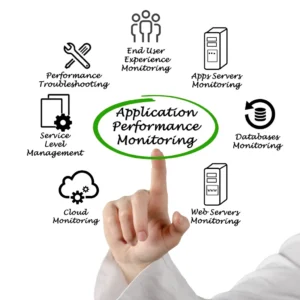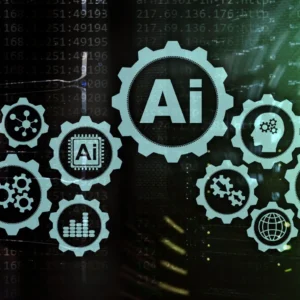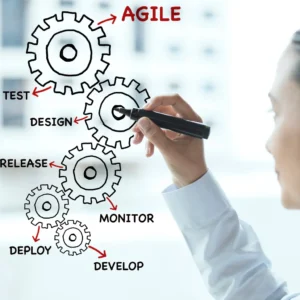
Unleashing Efficiency and Productivity
Exploring the Power of AI in Intelligent Process Automation
Do you find yourself exhausted by repetitive and time-consuming tasks?
Intelligent Process Automation (IPA) is the solution. AI in Intelligent Process Automation is transforming how businesses operate by automating mundane tasks and improving decision-making processes.
Utilising machine learning and robotic process automation, AI in Intelligent Process Automation efficiently handles large amounts of data, simplifying decision-making and task execution. By allowing AI to handle mundane tasks, your team can devote more time to impactful initiatives.
Join us on a journey into the world of AI-driven Process Automation and witness how innovation and efficiency are reshaping business operations. Expect tangible results such as cost savings, improved customer experiences, and streamlined processes.
Trust us, and you won’t regret it!
Table of Contents

Arindam Roy
An Automation Consultant with 25+ years of IT Experience
Understanding Artificial Intelligence (AI) in IPA
The field of AI is constantly evolving, and it’s fascinating to see how it’s impacting various industries. AI technology has revolutionised Process Automation, making it more efficient than ever before.
It can automate complex business processes, particularly data analysis, decision-making, and predictive maintenance tasks. With NLP, machines can now understand human language, increasing accuracy and speed.
AI-powered BPA enables organisations to handle larger data volumes, resulting in unprecedented productivity efficiency. Adopting AI-driven Process Automation is a surefire way for businesses to gain a competitive edge.
It’s evident that AI is the future of automation, and we can’t wait to witness its continued growth and innovation.
Benefits of AI in Intelligent Process Automation
Organisations seeking to simplify their processes can achieve significant advantages by implementing AI in Intelligent Process Automation.
This advanced technology provides numerous benefits, such as greater precision, speed, and scalability, which can reduce costs and boost efficiency. With AI taking over repetitive tasks, employees can utilise their time for more significant work, resulting in further innovation and long-term prosperity.
By adopting AI in Process Automation, businesses can maintain their competitive edge, optimise their operations, and achieve sustainable growth.
Critical Components of AI-powered IPA
Using AI-powered components is essential for businesses to automate their processes efficiently. Intelligent algorithms and models are crucial for seamless and effective automation.
Data Collection
AI-powered Process Automation requires high-quality data from various sources to fuel algorithms and enable informed decision-making.
Data Analysis
AI algorithms analyse collected data to uncover patterns, detect anomalies, and extract insights, helping organisations improve processes.
Decision-Making
AI-powered decisions use data and algorithms to improve efficiency, reduce bias, and ensure consistency.
Intelligent Algorithms
IPA automation uses advanced algorithms like machine learning and neural networks to learn from data and improve continuously.
AI-powered Process Automation helps organisations streamline operations, optimise resource allocation, and improve efficiency by automating processes and decision-making.
This game-changing technology is revolutionising companies’ operations, unlocking new business possibilities to drive sustainable growth in the digital transformation era.
Use Cases of AI in Process Automation
AI technology has significantly changed various industries’ Business Process Automation (BPA). It has helped businesses to improve their operations and increase efficiency in today’s fast-paced world. The impact of AI on task management in these industries is remarkable, and the transformation it has brought about is genuinely incredible.
Finance
AI streamlines finance by automating repetitive tasks like data entry, credit score evaluations, and fraud detection. It helps businesses make informed decisions and speeds up loan approvals. AI chatbots provide personalised customer support, resolving queries and issues quickly.
Healthcare
AI assists healthcare by managing records, scheduling appointments, and performing diagnostics. Natural Language Processing enables faster and accurate diagnoses by extracting information from patient records. AI also detects abnormalities in medical images, helping radiologists provide precise interpretations.
Manufacturing
AI-powered Process Automation can help manufacturing companies optimise supply chain management, predictive maintenance, and quality control. By analysing real-time production data, AI algorithms can predict equipment failures, and computer vision systems can detect defects, ensuring consistent quality and reducing manual inspection.
Customer Service
AI-powered chatbots and virtual assistants are available 24/7 to support and answer your queries. They can personalise the conversation and guide you through self-service options for a more efficient experience. AI-powered customer service is the future!
Education
IPA makes education easier by automating tasks and personalizing learning experiences through data analysis. This allows educators to focus on teaching and supporting students, rather than tedious tasks.
Data Gathering
Finally, AI-driven Process Automation automates data extraction, classification and validation tasks in document processing. By understanding the content and structure of documents, AI systems can process large volumes of information rapidly and accurately.
AI-powered Process Automation can automate tasks across industries, from data entry to customer support and supply chain management. By embracing AI, organisations can streamline processes, reduce costs, and enhance productivity, driving business success in the digital age.
Implementation Challenges and Considerations
AI-powered Process Automation implementation poses challenges and requires responsible AI practices for successful deployment.
Data Privacy
IPA should safeguard sensitive data by following privacy regulations during data collection, storage, and processing.
Integration Complexities
Integrating AI requires careful planning to ensure seamless integration with legacy systems and third-party applications.
Change Management
Transitioning to IPA means adapting workflows, roles, and responsibilities. Involve employees, provide training, and address resistance or concerns.
Selecting AI Tools and Technologies
Organisations must choose the right AI tools based on their needs, objectives, and requirements. Evaluate solutions for scalability, ease of use, compatibility, and vendor support.
Ethical and Responsible AI Practices
Organisations must prioritise ethical AI practices: avoid bias, be transparent, and maintain fairness and accountability.
Best Practices for AI-powered Process Automation
Implementing AI-powered Process Automation requires adherence to best practices to ensure successful outcomes and maximise the benefits of automation. Here, we discuss essential best practices for AI-driven BPA and emphasise the importance of continuous monitoring, feedback loops, and iterative improvements.
Identify Appropriate Use Cases
Prioritise use cases well-suited for AI-driven automation. Start with processes that are repetitive, rule-based, and time-consuming. Assess the feasibility and potential impact of automation in each use case to prioritise implementation efforts effectively.
Define Clear Objectives
Clearly define the objectives and desired outcomes of the AI in Intelligent Process Automation initiative. Align the automation efforts with strategic business goals and identify specific metrics to measure success. This ensures a focused and targeted implementation.
Continuous Monitoring and Feedback
Implement continuous monitoring of AI-driven processes to identify anomalies, errors, or performance issues. Establish feedback loops to gather insights from users and stakeholders, enabling iterative improvements and fine-tuning automation algorithms.
Scalability and Flexibility
Design AI-driven Process Automation initiatives with scalability and flexibility in mind. Plan for future growth and changing business needs by selecting technologies and architectures that adapt to evolving requirements.
Conclusion
Intelligent Process Automation (IPA) powered by AI has the potential to transform the way organisations operate entirely! Just think about it: increased efficiency, accuracy, and scalability by automating complex tasks.
However, organisations must address challenges related to data privacy, integration complexities, and change management to take advantage of this technology fully.
Related Articles
- Choosing the Right Automation Tool in 7 Steps
- A 9-Step Guide to IPA Implementation: Energise Your Operations
- Navigating the Roadblocks of IPA – The Top 9 Challenges
- AI in Intelligent Process Automation – Unleash the Power of AI
- 9 IPA Examples in Small-Scale Industries
- Power of Intelligent Business Process Automation – Efficiency
- AI Business Process Management: Unleashing the Power
- Business Process Management with AI Integration
- AI for Reengineering Business Processes
- Hyperautomation: Redefining BPM with AI
- The Role of AI in Business Process Modelling
- AI-driven Customer Onboarding – Unleash the Power of AI
- Effective Process mapping in Intelligent Process Automation
- Intelligent Process Automation Adoption – The Best Strategy Guide
- TechInfra in IPA: A Comprehensive Guide
- Elevating Intelligent Automation with Continuous Improvement
- Comprehensive Approach to Cost-Benefit Analysis in IPA
- Vendor Selection in IPA – Comprehensive Guide
- Implementing Agile in Intelligent Process Automation (IPA)
- Scalability and Integration in Intelligent Process Automation
- Cognitive Automation in IPA: Innovating Ethical Efficiency
- Mastering Symphony: Bot Development in IPA Unveiled
- UI/UX Mastery in IPA: Elevating Automation Experiences
- Compliance and Security in IPA – A Guide Ensuring Trust
- Impact of Performance Monitoring and Analytics in IPA
- Driving Success: Data Management in IPA
- Crucial Role: Documentation in IPA Triumph
- Optimizing IPA – Continuous Improvement Strategies



























